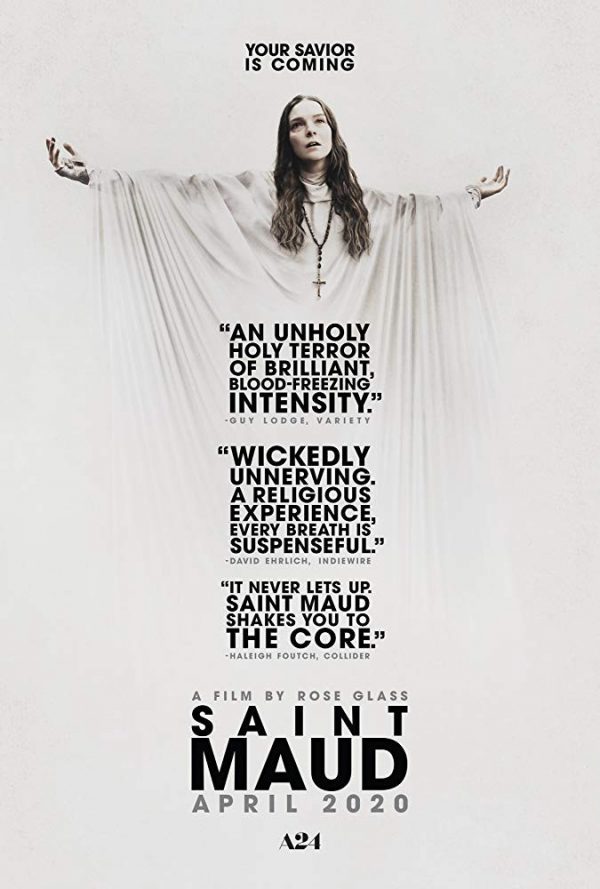Saint Maud. 2020.
Directed by Rose Glass.
Starring Morfydd Clark, Jennifer Ehle, Lily Knight, Lily Frazer, Turlough Convery, Rosie Sansom, and Marcus Hutton.

SYNOPSIS:
Follows a pious nurse who becomes dangerously obsessed with saving the soul of her dying patient.

To say A24 has a “type” when it comes to their horror stable is treading lightly. They’re more predictable than Leonardo DiCaprio’s dating preferences. Rose Glass’ Saint Maud is a rumination on religious absolve, divinity, and how we’ll believe anything with redemption at stake. It’s also cautious, reliant on a breakneck third-act payoff, and kept in the slowest gear for quite a long stretch. We’re talking about only an eighty-three-minute cinematic experience, but those expecting forthright aggression should assume more of The Witch or Hereditary – and still on the lesser pacing scale.
Maud (Morfydd Clark) is a private estate nurse who hears the voice of God. Her latest patient, dance enthusiast Amanda Kohl (Jennifer Ehle), eyes an upcoming expiration date due to terminal illness. After the two grow closer, Maud decides it’s her chosen mission to “save” Amanda. From what? Herself, her blasphemous ways, because God is waiting for another pure-as-snow angel. Mind you, Amanda hasn’t asked for any of this, but Maud will not allow the lord’s instructions to go unfulfilled – especially considering the reclusive nurse faces her own time of need after an obscure workplace trauma.
One day I’ll decipher how I can stumble out of The Lodge overcome with torturous devastation, yet remain generally unfazed by something like Saint Maud. The latter a film I appreciate more than “enjoy” (in horrific context). For a feature debut, Rose Glass has proven herself an artist propelled by conviction and patience. Committed to designed narratives that see through their fateful conclusions, in this case, bedeviled and piously sanctimonious. The way Glass unveils Maud’s “connection” is meditative, but when it comes down to it, predictable – which is my biggest viewing obstacle with such muted attributes.

The truth is, Morfydd Clark plays an anointed Maud with hypnotic and unsettled faith-based commital. We can’t quite tell if she’s being courted by a power from above or below, which comes with these sporadic bursts of body horror. Brief, sensual spurts where God’s voice turns into a warming presence that brings with it contorted elation. Clark is playing Mother Theresa within her own head, which Glass translates into a deeply unnerved tone as we’re subjected only to Maud’s viewpoint. Blocking out reality, allowing Clark to explore how easy it is to become ensnared in one’s own fantasy. Sickness versus salvation, as Maud forces herself through “trials” that Clark emphatically loses herself within.
The horror of Saint Maud is nestled under Maud’s own delusion. How projectile vomiting after a night of binge drinking can lead to epiphanic change or the way we see her figure misshape as “comfort” is embraced. Cinematographer Ben Fordesman uses the camera to heighten Maud’s emotions, e.g. flipping the frame upsidedown when she finds herself in a spell of perturbed doubt. Her life (and lens perspective) completely overturned, Glass always sure to keep panning motions slow and steady as never to ignore the long-game at play. This is where my comments of “appreciation” ring truest, as technical filmmaking merits are invasive and meticulous. Shot with visual intent, thrusting us into Maud’s heavenly call to arms.
My pause comes with Glass’ “payoff” in mind, as the painstaking work to reach said point requires something revelatory to stick said landing. Saint Maud takes a massive risk that shan’t be accepted by all audiences, as this is contemplative horror derived from biblical obsessions. Jennifer Ehle’s portrayal of Amanda is that of a serpent in Maud’s eyes, trying to denounce her master’s guiding plans. Where Maud strays, how Glass concludes, follows footsteps in the sand we’ve seen once or twice before given the subgenre’s almighty canon. Ehle’s softly hedonistic performance evokes necessary volatility and her string-along tactics make for diabolical chemistry we hope will backfire, but not all might find urgency in the cat-and-canary situation. Thus weakening, or outright ruining, the jarring final punch Glass throws.
Saint Maud is aesthetically brooding, torturously devoted to exploring mankind’s most selfish martyrdoms, and, yes, accomplishes sainthood bastardization – if a bit too confident in impact upon exit. Rose Glass takes a simple caretaker scenario and keeps her holy infection even simpler, for better and worse depending on which scene you select. Granted, Morfydd Clark’s performance is too fascinatingly spirited and cracked around edges to ignore. There’s more substance here than, say, style-forward Gretel & Hansel. Hereditary bludgeons horror audiences with heartbreaking disregard throughout, The Witch better simmers rapturous terror, and while Saint Maud is less pronounced in comparison to both, the film still holds a redeeming secret weapon: Miss Maud herself.
Flickering Myth Rating – Film: ★ ★ ★ / Movie: ★ ★ ★
Matt spends his after-work hours posting nonsense on the internet instead of sleeping like a normal human. He seems like a pretty cool guy, but don’t feed him after midnight just to be safe (beers are allowed/encouraged). Follow him on Twitter/Instagram/Letterboxd (@DoNatoBomb).











